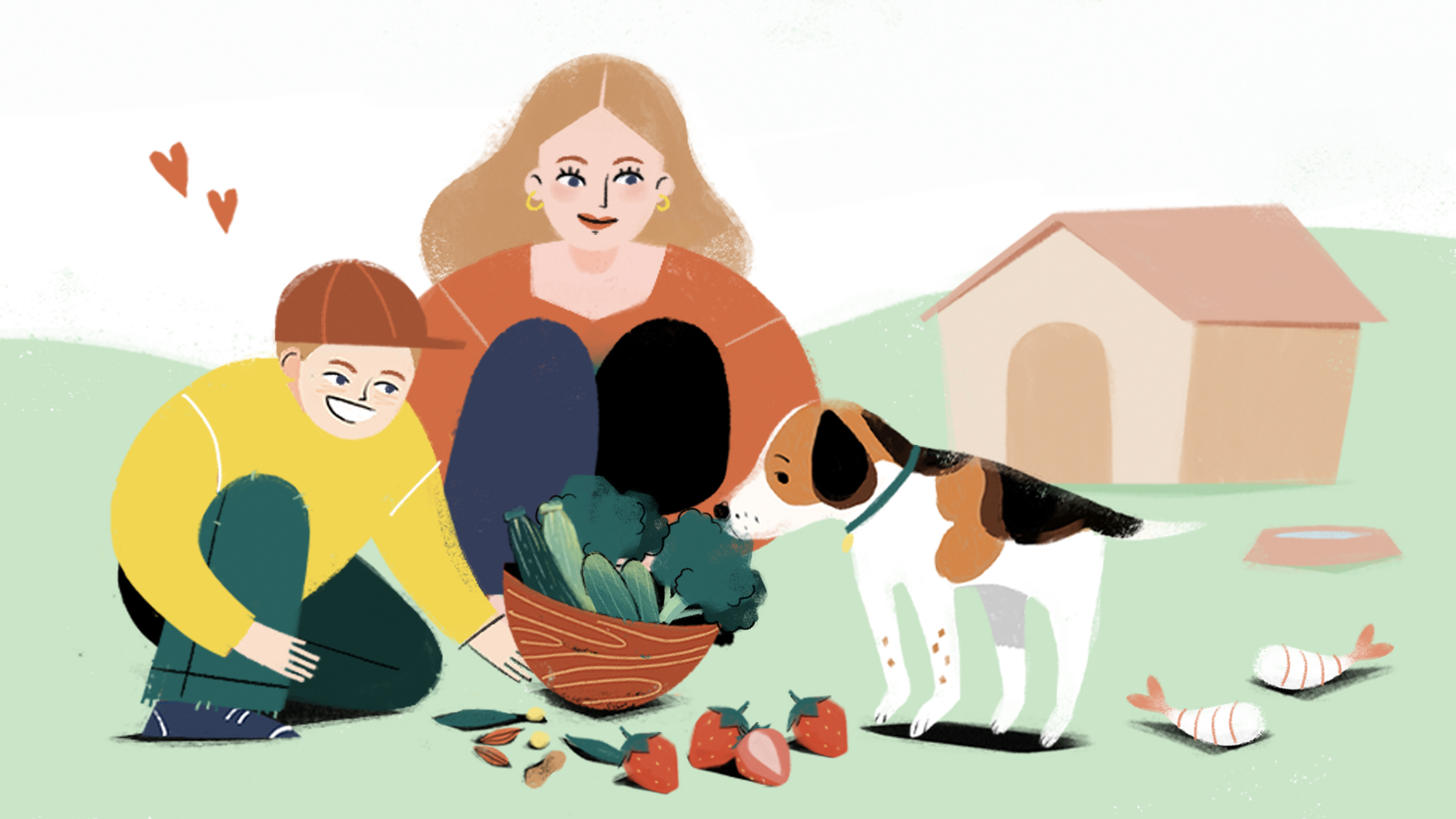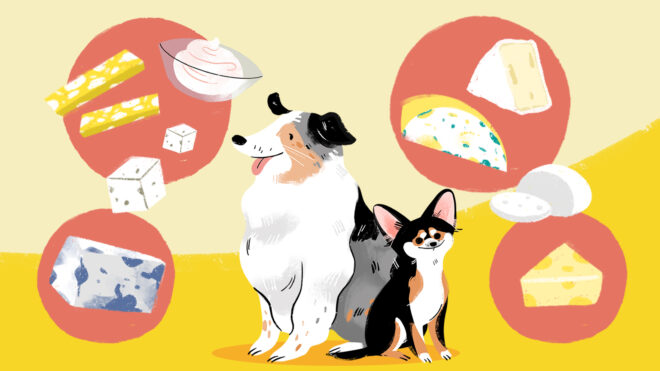
Having a dog in the house is a great way to boost family morale. But it’s important to also know how to properly take care of a dog. Dogs are a big responsibility. Not only do you need to feed them daily, but you need to feed them the right nutritionally balanced food. That said, there are a few common foods dogs can eat that will actually benefit their health.
On the other hand, there are also a lot of common foods dogs can eat accidentally that’ll land you at the emergency vet. With many dogs, it can be tough to tell how much of the common food will get them in trouble. You probably know that chocolate is a big no-no when it comes to canine care. Chocolate is toxic to both dogs and cats, so it’s a treat you’re better off not sharing.
Here are 10 common foods dogs might want to eat if they’re scavenging for table scraps. While some are encouraged to be snacked on, others are more dangerous than people may think.
Can dogs eat pizza?

Pizza is a favorite food for many of us. So it may be tempting to share the rare extra slice with your furry friend. But can dogs eat pizza? The answer is a bit complicated.
While a bite or two likely won’t hurt your dog, it’s generally a bad idea to feed your pup pizza. Keep in mind that pizza types vary. Those that are heavy with garlic and onions are a definite no. Pizzas that you make at home may be slightly safer since you’re in charge of the ingredients, but it’s still not a nutritious treat for dogs. Pizza toppings can also be risky.
Pizza is also high in sodium, and too much sodium is not great for either you or your dog.
Can dogs eat strawberries?

Who doesn’t like strawberries? They’re a great healthy snack, and they’re easy to throw in a salad or put on top of cereal. But can dogs eat strawberries?
According to Purina, the answer is yes. Strawberries are a healthy treat for your dog. You just don’t want to make a full meal out of them. If anything, they should be used as a snack — and cutting them up makes sense, especially for smaller dogs to consume. There’s such a thing as “too much of a good thing,” and that applies to dogs eating strawberries.
Can dogs eat broccoli?

Broccoli is nutritious and versatile. It’s an easy side to make with any dinner. But if a few florets fall on the floor, is it OK if your dog eats broccoli?
The answer is yes — dogs can eat broccoli. Broccoli is a great treat for them, and it’s OK if they consume it either raw or cooked. The one issue to look out for is oils and seasonings. So it’s not a great idea to give your dog leftover broccoli from your Chinese food order. But it is OK to feed dogs broccoli that’s straight from the produce aisle.
Can dogs eat cheese?

Cheese is one of the best comfort foods out there. And it’s extremely versatile. A cheese and cracker plate is always a great appetizer when you’re entertaining guests. But can dogs eat cheese? Or should they stay far away?
Yes, your dog can eat cheese. But they should do so sparingly. Cheese offers a lot of nutritional benefits but also has a lot of negatives. For one, cheese can make your dog gain weight. And according to the American Kennel Club, too much cheese can lead to a case of pancreatitis in your pup. So proceed with caution.
Can dogs eat shrimp?

During one New Year’s Eve, my dog suddenly had an interest in the shrimp ring. It was then that I googled, “Do dogs eat shrimp?” — secretly hoping that the answer was no. That would mean more shrimp for me.
But the opposite was true. Dogs can eat shrimp. And shrimp is actually pretty good for dogs on occasion. The AKC states that the nutrients in shrimp, like vitamin B12 and vitamin B3, will help your dog stay healthy. That said, too much shrimp adds up to being high in cholesterol. So just a few would be a good treat.
Can dogs eat onions?

If you’re prepping a salad in the kitchen and an onion slice falls over, should you be worried if your dog gets to it before you do?
The answer is yes. Dog’s should not eat onions. In fact, the AKC reports that every part of an onion is toxic to dogs. Onion powder can be even more fatal, if they happen to sneak into your spice rack.
That said, even things that contain onion powder are a hazard. “Onion powder is in a surprisingly wide range of foods, from soups to baby food,” the AKC writes.
Can dogs eat cucumbers?

They’re crunchy, green, and great for snacking on. But can dogs eat cucumbers, too? Since cucumbers are such good pals with onions, you may be a little concerned.
But good news. Dogs can eat cucumbers. And as far as common foods your dog can eat, zucchini is also a great choice. Now, whether your dog actually likes to eat cucumbers is another story. For some dogs, it’s a bit of a strange texture.
Can dogs eat potatoes?

Out of the common foods dogs can eat, where do potatoes fall on the list? Are potatoes safe for dogs?
While they’re delicious for humans, potatoes are actually on a dog’s “do not try” list. That is, raw potatoes at least. Raw potatoes can be harmful to dogs. If you feel the need to give potato to your dog, it should be boiled or baked before being consumed. Still, it’s best not to risk it. Especially since there are so many other common foods dogs can eat that are actually beneficial.
Can dogs eat nuts?

Plenty of dogs like peanut butter. But are regular nuts safe for dogs? And are other nut spreads healthy for dogs?
As you might assume, most nuts are safe for dogs. But that doesn’t mean that you should serve your pup a dinner of cashews and almonds. There’s no nut that’s extremely healthy, but there are some nuts your dogs should avoid.
Macadamia nuts, Brazil nuts, and any nuts with a coating of flavoring should be out of a dog’s reach at all times. Ollie writes that macadamia nuts are the most dangerous, and even a small amount can cause joint damage and vomiting.
Can dogs eat bread?

Ever wonder whether or not dogs can eat bread? Bread is such a standard food that’s enjoyed by many, so it’s important to know whether or not bread harms your dog.
White and wheat bread are both considered to be safe for dogs to eat. Other breads are more iffy, and garlic bread is definite a no. Bread often serves as a filler, and there’s not a ton of nutritional benefit to bread. It may be delicious and an essential part of a sandwich, but it’ll never be able to replace a dog’s standard diet.
Too much bread can make your dog gain weight unnecessarily, which is also a health risk. But a few bites of a slice on occasion won’t do much hard.







